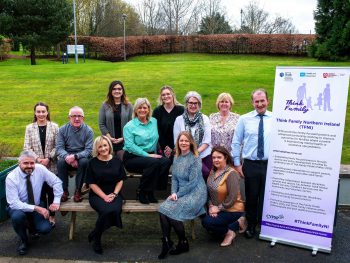5th April 2023

A re-launched initiative in the Southern Health and Social Care Trust will focus on the wider family needs of people with parental mental health and/or substance use challenges.
The ‘Think Family’ approach extends beyond the individual parent being supported and identifies the whole family’s needs through enhanced collaborative working.
This initiative will enable professionals to coordinate responses to families as a whole as opposed to looking at them individually which will have better outcomes for relevant adults, children and families.
Specialist Think Family social work roles have been established within the Trust.
Bernadette Bell, Think Family Senior Social Work Practitioner, said:
“Northern Ireland has the highest prevalence of parent mental health challenges in the UK and recent research found that children impacted were twice as likely to have an anxiety or depressive disorder problems themselves.
“We recognise that in order to support families to make changes that are helpful and long lasting, we need to support all family members so that they are able to get the support they need at the right time to enable them to achieve positive changes and improve their lives.
“By identifying challenges early, all services can work closely together to help prevent a family’s needs escalating and requiring more intensive, specialist intervention.
“Adults and children do not exist in isolation and our ‘Think Family’ initiative aims to promote the importance of a whole-family approach.”
Colm McCaffrey, Executive Director for Children and Young People and Social Work, said:
“We are delighted to refocus this new initiative within the Trust which represents a strategic effort to promote Family-Focused Partnership (FFP) within adult mental health and children’s services.
“It will assist in ensuring that the family’s needs are met, families are able to better care for each other and be better supported.”
Jan McGall, Director of Mental Health and Learning Disability, said:
“This approach will see our teams and services communicate with each other whilst working with different family members and coordinate those efforts for the best outcomes of the whole family.
“Through all of this working together we can be more effective and improve lives.”




